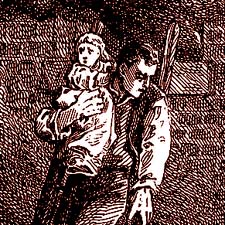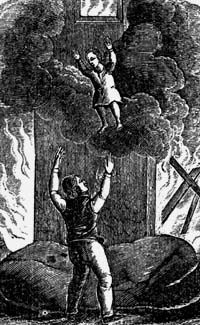| The Noble Sailor |

SEACOAST POETRY
A Portsmouth sailor saves a baby. Click for the whole story.
Swift up the burning stairs,
With daring feet he flew;
While sable clouds of stifling smoke
Concealed him from the view.
Portsmouth journalist Charles Brewster, in his "Rambles About Portsmouth" offers a revelation. He knew who saved the baby in the popular 19th century poem "The Noble Sailor".
 Brewster was referring to a poem about a sailor who, in 1835, rushed into a burning building and resuced a child. The event happened in New York and the media searched wildly at the time for the identity of the brave sailor.
Brewster was referring to a poem about a sailor who, in 1835, rushed into a burning building and resuced a child. The event happened in New York and the media searched wildly at the time for the identity of the brave sailor.
In the mid-1800s Brewster revealed the identity of the man as William Rindge, a Portsmouth-born son of John P. Rindge. We have no way of knowing if Brewster’s backstory is true. According to Brewster, young Rindge later died of consumption. Rindge told Brewster that he contracted a cold while saving the baby and that cold evolved into consumption. His good deal, therefore, was the death of him. Whether or not William Ringe was the mysterious Samaritan, it makes a great story.
Think of her as the Barry Manilow of her age. Victorian readers loved melodrama and romance and the prolific Mrs. Sigourney gave it to them. Lydia Howard Sigourney (1791 – 1865) is best known as the "Sweet Singer of Hartford". Although her husband insisted that she stop writing, he changed his mind when his fortunes failed and her income increased. She was able to manufacture an average of three pages of poetry daily and went on to tour Europe in the Romantic Era. If Mrs. Sigourney had only known the ending to "The Noble Sailor", she would certainly have had another sentimental poem. – JDR
READ: Brewster’s account
READ ABOUT: Portsmouth's 3 Big Fires
THE NOBLE SAILOR
By Mrs. Sigourney
It was a fearful night;
The strong flames onward spread
From street to street, from spire to spire,
And on their treasures tread.
Hark! 'Tis a mother's cry,
High o'er the tumult wild,
As rushing toward the flame-wrapt home,
She shrieked, "My child! my child!"
A wanderer from the sea,
A stranger marked her woe,
And in his bosom woke
The sympathetic glow.
Swift up the burning stairs,
With daring feet he flew;
While sable clouds of stifling smoke
Concealed him from the view.
Fast fell the burning beams
Across the dangerous road,
Till the far chamber where he groped,
Like fiery oven glowed.
But what a pealing shout
When from the wreck he came,
And in his arms a smiling babe,
Still toying with the flame.
The mother's raptured tears
Forth like a torrent sped;
But ere the throng could learn his name,
That noble tar had fled.
Not for the praise of man
Did he this deed of love;
But on the bright, unfading page,
'Tis registered above.
